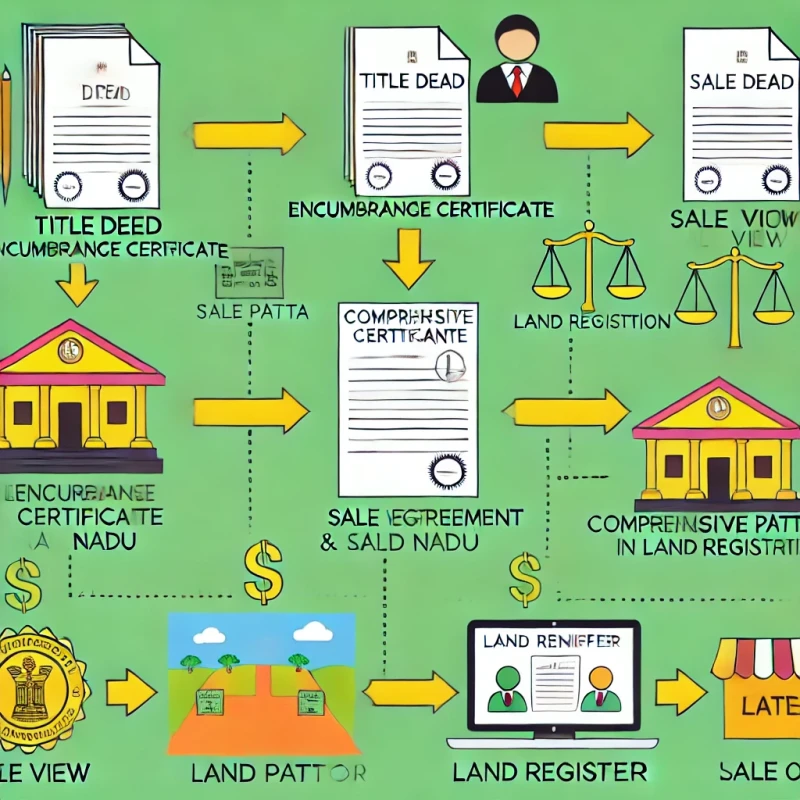- Nov 13, 2024
-
A Comprehensive Guide to Legal Documentation and Verification When Buying Land in Tamil Nadu
Buying land in Tamil Nadu involves a thorough verification process to ensure the transaction is legal and secure. From obtaining a legal opinion for land to securing a comprehensive patta and reviewing the encumbrance certificate, there are several steps to follow. Here, we’ll cover the key documents and procedures needed, including land buying procedure in Tamil, land document verification, and how to view EC online in Tamil Nadu.
This guide will help you navigate the documentation requirements and make informed decisions for a safe and transparent land purchase.
1. Legal Opinion for Land and Property
Obtaining a legal opinion for land or property is essential when buying real estate in Tamil Nadu. A legal opinion from a qualified lawyer or real estate expert ensures that the property is free from disputes, encumbrances, or ownership claims.
Why Get a Legal Opinion?
- Ownership Verification: Ensures that the seller has full legal rights to sell the property.
- Encumbrance Check: Confirms there are no outstanding mortgages, loans, or claims on the property.
- Compliance with Zoning Laws: Ensures the land complies with local zoning and land-use regulations.
Steps to Obtain a Legal Opinion for Land in Tamil Nadu
- Hire a Real Estate Lawyer: Select a lawyer experienced in property transactions in Tamil Nadu.
- Document Collection: The lawyer will require documents such as the title deed, patta, and encumbrance certificate to assess ownership and legality.
- Title Verification: The lawyer will examine the history of ownership and ensure there are no legal disputes.
- Encumbrance Check: The lawyer will review the encumbrance certificate to verify any financial claims on the property.
2. Comprehensive Patta for Land
In Tamil Nadu, a comprehensive patta is a vital document that proves land ownership. It contains the survey number, location, and measurements of the land.
How to Apply for a Comprehensive Patta
- Visit the Taluk Office: Submit a request for a patta transfer if you are the new owner.
- Submit Required Documents: These include the sale deed, encumbrance certificate, and identification proofs.
- Inspection: Revenue officials may inspect the land to verify details before issuing the patta.
- Receive Patta: Once verified, the patta will be updated with your name and details.
3. Encumbrance Certificate in Tamil Nadu
An encumbrance certificate (EC) is an official document showing the history of financial transactions related to the property. In Tamil Nadu, you can view the encumbrance certificate online or obtain it from the local sub-registrar’s office.
Steps to View EC Online in Tamil Nadu
- Visit the TNREGINET Portal: Go to the official website for Tamil Nadu’s Registration Department.
- Select 'Encumbrance Certificate': Choose the option to search for an EC by property details.
- Enter Plot Details: Provide the survey number, document number, and location.
- View EC: The online EC view will show details of financial claims or encumbrances.
Importance of an Encumbrance Certificate
- Verification of Clear Title: Ensures no outstanding loans or legal claims on the property.
- Required for Patta Transfer: The EC is necessary for transferring the patta to your name.
- Validity for Legal Opinion: It is crucial for obtaining a legal opinion on the land.
4. Land Buying Procedure in Tamil
The land buying procedure in Tamil Nadu involves a series of steps to legally transfer ownership. Here’s a breakdown:
Step-by-Step Land Buying Procedure
- Document Verification: Ensure you have all required documents, including the title deed, patta, and EC.
- Legal Opinion for Property: Obtain a legal opinion to confirm the property is free from disputes.
- Draft Sale Agreement: Sign a sale agreement with the seller, detailing payment terms and conditions.
- Patta Transfer: Apply for a comprehensive patta in your name once the sale is finalized.
- Registration: Register the land at the local sub-registrar’s office, paying applicable stamp duty and fees.
Key Documents Needed
- Title deed, Encumbrance certificate, Sale agreement, Comprehensive patta, Property tax receipts, Survey map, and No Objection Certificates (if applicable).
5. Land Document Verification
Proper land document verification is essential for a legally compliant transaction. This includes verifying the title, patta, EC, and tax receipts to ensure authenticity.
Important Documents for Land Verification
- Title Deed: Proof of ownership.
- Encumbrance Certificate: Ensures no claims on the property.
- Property Tax Receipts: Confirms that taxes are up to date.
- Survey Map: Identifies the plot’s boundaries.
- Patta: Confirms ownership and location.
Document Verification Checklist
- Verify the title deed is in the seller’s name.
- Cross-check EC details for any outstanding liabilities.
- Ensure property tax receipts are recent and indicate no dues.
- Confirm the patta matches the survey number and plot boundaries.
6. Land Comprehensive Review
A land comprehensive review involves thoroughly assessing all aspects of the land, including legal compliance, financial freedom, and suitability for development.
Comprehensive Review Steps
- Legal Opinion: Consult a lawyer for a complete review of legal documents.
- Encumbrance Check: Verify financial liabilities with an EC.
- Survey Verification: Ensure the land dimensions align with the survey map.
- Zoning Compliance: Check local zoning rules to confirm the intended use is allowed.
Conclusion: Ensuring a Smooth Land Purchase in Tamil Nadu
Buying land in Tamil Nadu requires careful documentation and legal verification. From obtaining a legal opinion for land and reviewing the comprehensive patta to viewing the EC online and following the land buying procedure in Tamil, each step is essential for a secure transaction. By verifying all necessary documents and consulting with professionals, you can ensure a transparent, hassle-free purchase and enjoy your investment with confidence.



Comments :
Currently, there are no comments in this post. Be the first person to comment on this post.